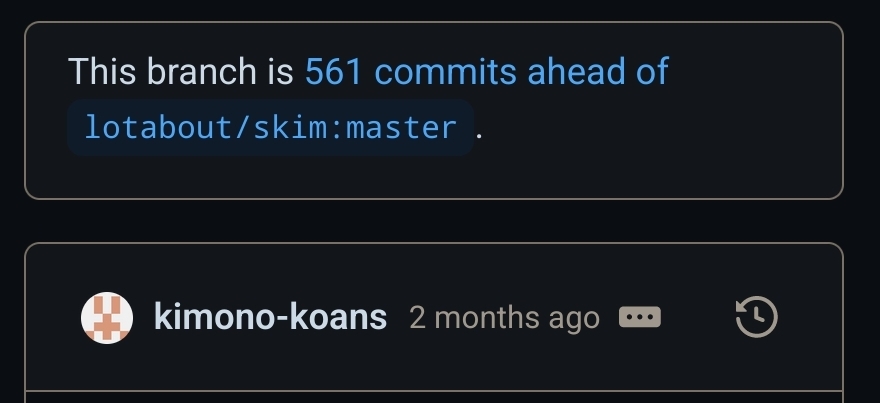- Fedora 37 - 2022-11-15; Nobara 37 - 2023-01-07
- Fedora 38 - 2023-04-18; Nobara 38 - 2023-06-26
- Fedora 39 - 2023-11-07; Nobara 39 - 2023-12-26
- Fedora 40 - 2024-04-23; Nobara 40 - 2024-06-19 (assuming an average delay of 57 days)
You won't find any alternatives because Flatpak has won the war. Pretty much everyone (except Canonical) hates Snap and avoids it like the plague, and AppImages have significantly dropped in popularity amongst users due to the rise of Flatpak, and the various advantage it has over AppImages. So you're left with only Flatpak/Flathub basically.
skim has unfortunately been abandoned, there have been no updates in an year, and several old PRs and issues remain untouched. The current recommend fork is two_percent, which is also more faster and memory efficient.
If you're facing the same issue with two_percent as well, you can reach out to the author in this thread, since they haven't yet opened up their issues tab.
It's one of the only ways I know of to make a Windows ToGo installation (equivalent of a Linux Live USB),
You can also use WinToUSB for that btw. Yet another option is to install Windows to a VHD file (using a virtual machine, or using Disk2VHD to convert an existing install), then copy it to your USB, and make it bootable using Ventoy. The latter option is more useful, since with Ventoy you could have multiple other Linux ISOs (or other OS/rescue images) all on a single, portable drive.
No, you're looking at the commit log for skim. two_percent was last updated two months ago. I also had a chat with the author yesterday and they're keen to continue maintaining the fork.

It's faster and more memory efficient basically. skim also appears to have been abandoned (no updates in over an year), whereas two_percent is being actively developed.
Kiwi here, no such issues with my Sync. Is there a particular community where you see these errors mainly (if so, can you link it here)?
Also, when you get those errors, it might be worth accessing that community directly using a local account - and if the images load fine, that would point to a federation issue with your server.
Those of you reading this might also be interested in two_percent, which is a fork of skim, which in turn is a Rust implementation of fzf. two_percent is faster, more efficient and uses less memory than fzf, which is especially noticeable with large inputs.
In that case, I agree with the others and say leave this up to the router - not only is it far more easier to set up, it gives you/your kid the freedom to switch between distros/OSes, and you can even swap computers without worrying about having up the controls all over again.
A friend of mine was in the same situation as you (he's also a Linux nerd), and he ended up with the router thing, and after extensive research, he decided to get a Synology router as it had all the features he was after (mainly limiting access times, monitoring and reporting). See: https://www.synology.com/en-global/srm/feature/device_content_control
And for extra filtering, you could also set the upstream DNS on the router to a filtering service such as Cloudflare for Families, AdGuard DNS Family etc.
I disagree with @Shareni@programming.dev (sorry!) - the biggest issue right now is that package maintainers are leaving in droves - at least 15 contributors left a few days ago, a number which has likely increased these past few days - and will continue to increase. I think the only people left will be the ones who support Eelco and the toxic culture brewed by him.
What this means is that you risk your packages getting out of date, including slow delivery of security updates (which was already an increasing concern, due to the way the Nixpkgs build system worked). Worst case scenario, some (many?) packages may never even get an update.
So now's definitely NOT a good time to switch, and in fact I'd also urge existing users to look at other distros, at least temporarily until this whole thing settles down.
Pretty much the same as you, but I do yoga instead of qigong. Plus I focus a lot on diet and nutrition and try to make sure I'm getting everything I need, whilst trying to minimise or avoid things that are bad for you, like processed foods, sugary stuff etc. Bought a Garmin smartwatch and smart scales last year to keep a track of my exercise goals, hydration, HRV, and sleep quality, and that's been real helpful in keeping track of my health.
Also planning to take up some basic martial arts as well; I was looking at kyokushin, but might pick wing chun due to it's practicality / self-defence aspects.
Bonus question: Where else can I post questions besides Ask Lemmy?
You can also post questions on Ask Lemmy's evil twin - !asklemmy@lemmy.world
doas is quite popular in the BSD world, and was ported to Linux a few years ago (via the OpenDoas project).
For starters, it's is a lot smaller than sudo - under 2k lines of code vs sudo's 132k - this makes it lot more easier to audit and maintain, and technically less likely to have vulnerabilities.
Another security advantage is that doas doesn't pass on the environment variables by default (you'd have to explicitly declare the ones you want to pass, which you can do so in the config).
The config is also a lot simpler, and doesn't force you to use visudo - which never made sense to me, visudo should've just generated the actual config, instead of checking it after the fact. Kinda like how grubby or grub2-mkconfig works. But no need for that complexity with doas.
Eg, the most basic doas config could just have one line in the file: permit: wheel. Maybe have another line for programs you want to run without a password, like permit nopass dexter cmd pacman.